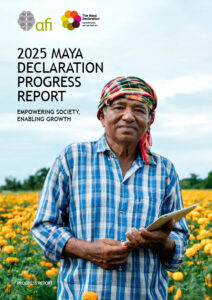In 2011, AFI members adopted the first global and measurable set of financial inclusion commitments by developing country governments. Through the Maya Declaration, institutions publicly commit to championing financial inclusion, and contribute to the 2030 Sustainable Development Agenda.
As of September 2025, AFI member institutions from 79 countries have collectively made 1,469 Maya Declaration targets, covering all aspects of financial inclusion policy. The Maya Declaration has also paved the way for various subsequent AFI Accords.
Each year, AFI issues a Maya Declaration Commitment Award, recognizing a member’s achievements.
As of September 2025, AFI member institutions from 79 countries have collectively made 1,469 Maya Declaration targets, covering all aspects of financial inclusion policy. The Maya Declaration has also paved the way for various subsequent AFI Accords.
Each year, AFI issues a Maya Declaration Commitment Award, recognizing a member’s achievements.
How to make a Maya Declaration Commitment?
Text of the Maya Declaration
“We, the Members of the Alliance for Financial Inclusion, a network of central banks, supervisors, and other financial regulatory authorities, met in Riviera Maya, Mexico, from 28 to 30 September 2011, on the occasion of the Third AFI Global Policy Forum.
Recognize the critical importance of financial inclusion to empowering and transforming the lives of all our people, especially the poor, its role in improving national and global financial stability and integrity and its essential contribution to strong and inclusive growth in developing and emerging market countries;
Reaffirm the value of peer-to-peer knowledge exchange and learning among financial regulators and policymakers for the design and implementation of innovative financial inclusion policy solutions relevant to the developing world;
Recall our efforts over the last two years to strengthen and expand the AFI network and to identify and explore high-priority areas for financial inclusion policy in the developing world through AFI’s working groups; Commit as a network of developing and emerging market financial regulators and policymakers to:
- Putting in place a financial inclusion policy that creates an enabling environment for cost-effective access to financial services that makes full use of appropriate innovative technology and substantially lowers the unit cost of financial services;
- Implementing a sound and proportional regulatory framework that achieves the complementary goals of financial inclusion, financial stability, and financial integrity;
- Recognizing consumer protection and empowerment as key pillars of financial inclusion efforts to ensure that all people are included in their country’s financial sector;
- Making evidence-based financial inclusion policy a priority by collecting and analyzing comprehensive data, tracking the changing profile of financial inclusion, and producing comparable indicators in the network;
- Supporting access to finance for small and medium enterprises in acknowledgment of their shared objective with financial inclusion in promoting sustainable and inclusive development and spurring innovation.
We remain dedicated to making financial inclusion a reality through concerted domestic and global actions and actively sharing our knowledge and experience through the AFI network. We commit to delivering concrete financial inclusion outcomes for the developing world to provide sustainable, relevant, cost-effective, and meaningful financial services for the world’s financially unserved populations.

